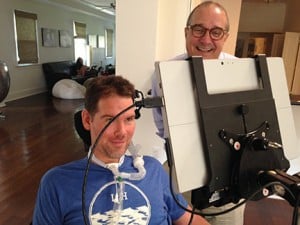
The Steve Gleason Act of 2015 unanimously passed the U.S. Senate on April 22 and is expected to have a good chance at passing the House. The Act will make it easier with people who have ALS and other speech-impacting disabilities to obtain Medicare funding for speech-generating devices and eye-gazing technology.
“Living with ALS is a tremendous challenge. Our bill will help empower people with ALS to live and work more independently and give them an opportunity to communicate with their loved ones,” said Sen. David Vitter of Louisiana in the New Orleans Times-Picayune. Vitter, a Republican, introduced the bill along with co-sponsors Sen. Amy Klobuchar, a Democrat, from Minnesota and Sen. Angus King, an independent, from Maine.
The Steve Gleason Act of 2015, is named after the former New Orleans Saints football player who was diagnosed with ALS in 2011. It provides for the following:
- Gives immediate relief for people who have been denied access to speech generating devices since a Centers for Medicare & Medicaid Services rule change in 2014
• Ensures SGDs are classified as medically necessary and are categorized as “routinely purchased” under Medicare
• Reverses the CMS capped rental policy to allow people to own their devices and continue using them in facilities such as nursing homes
• Ensures eye tracking technology and gaze interaction accessories are covered under Medicare for people with ALS and others with demonstrated medical needs.
“Communication is one of the most powerful tools humans possess, and is often taken for granted,” Steve Gleason said in a statement. “When you lose the ability to move and speak, communication becomes not only empowering, but also life sustaining. I have always said, until there is a medical cure for ALS, technology can be that cure.”
The legislation is still pending in the House but the bipartisan effort is likely to gain passage.
Support New MobilityWait! Before you wander off to other parts of the internet, please consider supporting New Mobility. For more than three decades, New Mobility has published groundbreaking content for active wheelchair users. We share practical advice from wheelchair users across the country, review life-changing technology and demand equity in healthcare, travel and all facets of life. But none of this is cheap, easy or profitable. Your support helps us give wheelchair users the resources to build a fulfilling life. |


Recent Comments
Kevin Hoy on TiLite Releases Its First Carbon Fiber Wheelchair
tuffy on NYDJ Launches Women’s Adaptive Jeans on QVC
Lisa Cooley on How to Fund an Expensive Adaptive Vehicle